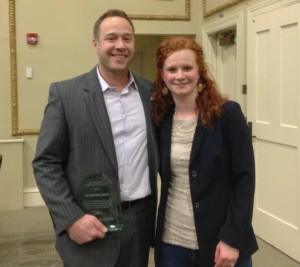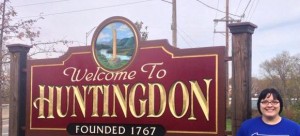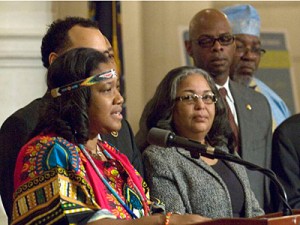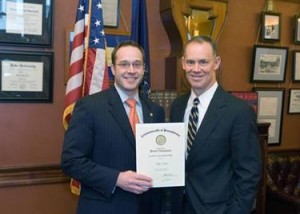Where do we go from here? The midterm election has given us more homework to do, and if we refocus, we can win.
All eyes on Rep. Mike Fleck’s re-election campaign
In understanding where they can side on LGBTQ issues, many Pennsylvania legislators have been paying close attention to the outcome of the 81st House District election. Rep. Mike Fleck, the state’s first openly gay legislator, lost his seat on Tuesday following a fiercely fought 22-month long campaign. His loss is devastating for many in his district, and thousands of LGBTQ people in Pennsylvania – particularly for rural LGBTQ youth who have lost positive representation in their government and community. Beyond the social impact, Rep. Fleck’ loss has significant political consequences as well. The outcome of this election will be sending a ripple effect throughout the commonwealth.
For a long time, there has been a widespread feeling of trepidation amongst the conservative legislators who control the General Assembly of engaging with LGBTQ issues. And so, there has been silence – even from those conservative legislators that support our causes, or those who are genuinely interested in learning more about LGBTQ issues. This lack of conversation has presented the opportunity to assess how Rep. Fleck performs in the election as their testing ground on LGBTQ issues without getting their own hands into the issues directly. If he lost, and depending by how much, that would be the measure by which they could make their future political calculations. Will supporting LGBTQ issues be worth it? If this Central Pennsylvania district cannot accept an out legislator, will they oust me if I support LGBTQ equality?
Pennsylvania legislators now have evidence to shelve LGBTQ rights
Legislators on both sides of the aisle have been looking to the 81st district to get a pulse on where middle-Pennsylvania stands. Would they embrace their longtime-adored state legislator in spite of his being out – or, would they oust him in a political subterfuge of bigotry? The latter appears to have become reality.
The Pennsylvania legislature has sustained deep-rooted silence on LGBTQ issues for decades. The status quo has been inaction for nearly 40 years since the first non-discrimination bill was introduced in 1976. When Rep. Mike Fleck came out in December 2012, he bravely helped change the discourse within the Republican majority. No longer was being gay something that could be ignored or be seen as being a complete outsider. He was and continues to be their respected colleague.
Moderate Republicans have the power: Will they use it?
Yet, as I write this, I wonder if the power of increased popular opinion toward LGBTQ rights could still help push things forward. At least for the moderate Republicans, especially in Eastern Pennsylvania, could his election serve as a shaming wake-up call toward action? Moderate GOP members who support LGBTQ equality have the votes and the power – but we do not know if they will use it. Will suburban Republicans lay themselves down on the line for us? If they do, we can win.
In a small way, Rep. Ron Marsico (R-Dauphin), from suburban Harrisburg, balked at this divide last month and put the LGBTQ-inclusive hate crimes bill up for a committee vote. He openly pushed back at members of his own party in the House Judiciary Committee during the meeting, when Rep. Brian Ellis (R-Butler) among others, called for him to table the bill. It ultimately passed 19-4.
The tides are changing in the popular support of LGBTQ equality, especially in moderate areas. Outside of Rep. Fleck’s race, it seems that not one other elected official lost because of their support for LGBTQ equality. This is a major development from just a few years ago when a position on marriage equality could cost someone their election.
We will have to look to the new House and Senate leadership for answers
While there are shifting attitudes with moderate Republican and Democrats in suburban regions, the widening margin of the social conservatives’ majority presents a serious blockade against significant progress.
It will take more than half the Republicans in each chamber, likely over two-thirds, to be fully supportive of an LGBTQ-related issue for it to move. While we could have the necessary number of votes to move a non-discrimination bill without a majority of the GOP members, the Republican leadership has not provided evidence it would be willing to fracture its caucus over our issues – as they have for the transportation bill or liquor privatization.
The Republicans will continue a strong rein in both legislative chambers. We do not yet know if it will be led by rural, more socially conservative Republicans, or the more suburban, moderate members. Even a mix of the two could provide progress for us.
Over the next month, political battles will wage behind the scenes for leadership positions within the General Assembly. Should the moderates secure control in key roles and committees, we can have hope. If not, we will have another two years of gridlock on LGBTQ equality issues.
Specifically, if we have key moderate allies in both the House Speaker and House Majority Leader, then we could actually see HB 300 assigned to a committee with a favorable chair and NOT the State Government Committee with Rep. Daryl Metcalfe (R-Butler) – and actually have it be put up for a vote on the House floor.
Money is where the heart is
One of our strongest indicators of this progress is within the many Republican House members who gave to Rep. Fleck’s campaign. An extremely diverse network of conservative Republicans came to his support. It would be one thing for a sitting legislator, running for re-election themselves, to say they support their friend Mike Fleck. It is quite another to give their money to his re-election campaign. The following Republicans gave to Rep. Fleck’s campaign over the past several months:
Rep. Ron Miller (R-York) $5,000
Rep. Marguerite Quinn (R-Bucks) $3,000
Rep. Jim Marshall (R-Beaver) $1,000
Rep. Nick Miccarelli (R-Delaware) $1,000
Rep. Stan Saylor (R-York) $1,000
Rep. Sheryl Delozier (R-Cumberland) $500
Rep. Frank Farry (R-Bucks) $500
Rep. Mark Mustio (R-Allegheny) $500
Rep. Donna Oberlander (R-Clarion) $500
Rep. Martin Causer (R-Bradford) $250
Rep. Tom Murt (R-Montgomery) $250
Rep. Kathy Watson (R-Bucks) $250
Rep. Gene DiGirolamo (R-Bucks) [through Good Jobs PA PAC] +$20,000
*Other legislators have given through their associated Political Action Committees
Will Governor Tom Wolf make deals to advance LGBTQ rights?
Another factor for us in the 2015-2016 session will be Governor-elect Tom Wolf. He ran on a pro-LGBTQ rights platform. However, in the partisan world we live in, he will be faced with a legislature that is not set out to work with him. If he can develop meaningful relationships with the legislative leaders, he could help us press for victories. Only time can tell.
It is my greatest hope that Rep. Fleck’s loss will not be a cautionary tale against supporting LGBTQ people. I am upset in thinking how many have viewed this race as a referendum on being out in rural Pennsylvania. I would rather us understand this in the spirit of Harvey Milk. If Rep. Mike Fleck should lose re-election, let that loss shatter every closet door.
We have had enough. If rural LGBTQ Pennsylvanians rise up – and if LGBTQ advocates in our cities reach out across the divide to help – there is nothing our community cannot accomplish. This work to nudge the movable middle of Republicans into becoming true LGBTQ allies is possible, but it will take serious commitment from us all.
The next steps for the Pennsylvania LGBTQ equality movement
The future of the LGBTQ justice movement rests in the hands of rural and suburban Pennsylvania legislators. No passionate speech by a progressive legislator in Philadelphia or Pittsburgh will deliver us LGBTQ equality. Will our broader community roll up our sleeves to work with our LGBTQ family in the Pennsylvania heartland, or will our metronormative movement infrastructure remain nested in Pittsburgh and Philadelphia? We must develop the capacity of our rural and suburban conservatives to love and affirm LGBTQ people in their communities in order for us to break down the barriers which prevent critical progress.

Rep. Mike Fleck and Fiona Grugan (Villanova ’13), a constituent, at the 2013 Pennsylvania Youth Action Conference at the University of Pittsburgh
(February 2, 2013)
I am proud that the 2015 Pennsylvania Youth Action Conference will be focused on “Cultivating New Possibilities for Rural LGBTQ Youth.” In providing a positive platform for rural LGBTQ youth leaders to be resilient in taking action out in the silence, our movement will take a major step forward toward a fully realized dream of social justice for all.
A substantial movement of rural and suburban LGBTQ people, allies, and legislators, will be necessary in the session ahead for our community to win – and we can do it.
The featured image for this post is Rep. Mike Fleck with PSEC leaders and Sen. John Wozniak (D-Cambria) at Johnstown Pride 2013 (Faith Elmes (PSEC Assistant Convener + IUP ’15), Rep. Mike Fleck, Mike Campbell (PSEC Delegate + IUP ’13), and Sen. John Wozniak)



 The Victory Fund’s base of supporters is largely built from cocktail parties and black-tie events which speak to the non-profit industrial complex. To survive in difficult economic times, when many LGBT organizations have shuttered, the organization may be drawn toward tactics of self-preservation over maintaining the integrity of their mission.
The Victory Fund’s base of supporters is largely built from cocktail parties and black-tie events which speak to the non-profit industrial complex. To survive in difficult economic times, when many LGBT organizations have shuttered, the organization may be drawn toward tactics of self-preservation over maintaining the integrity of their mission.


